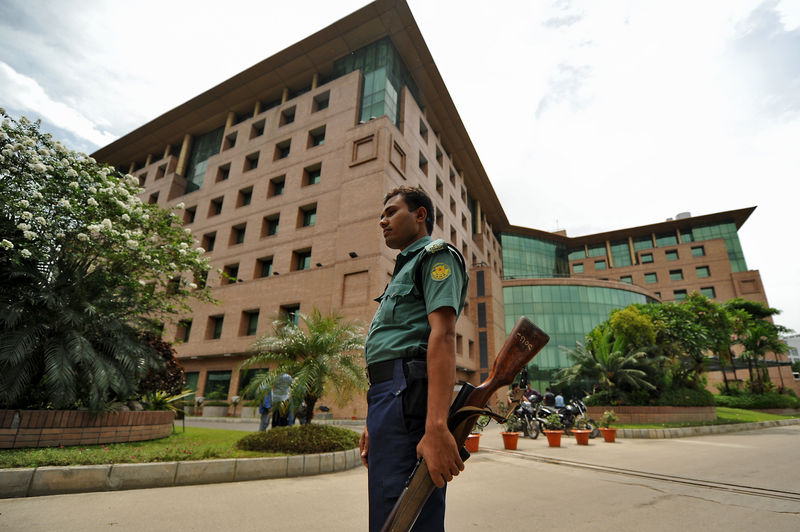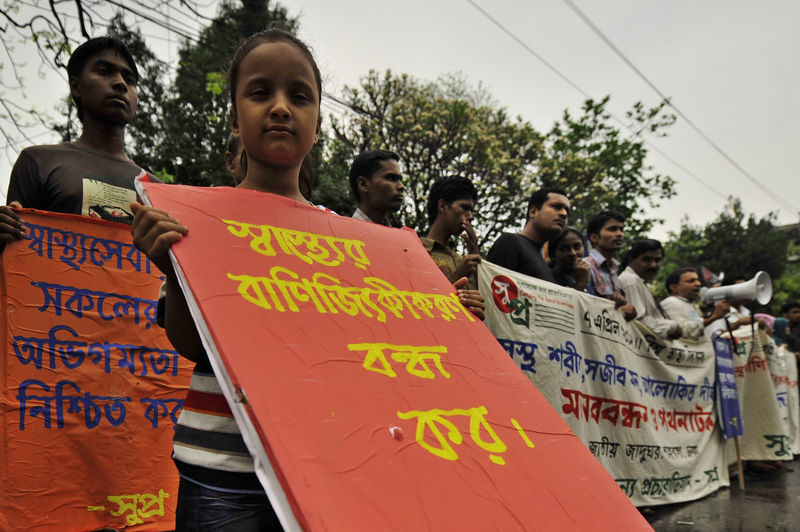
A police guards the front of United Hospital in Dhaka. Image by Firoz Ahmed. Copyright Demotix (7/7/2011)
United Hospital Ltd., a private hospital situated in the Bangladesh capital Dhaka, has bowed to pressure to release the body of a patient who died in its facility after initially refusing because the man's family couldn't pay the bill immediately, sparking public outrage.
The patient was transferred to United Hospital from another hospital on July 3 with cardiac problems and multi-organ failure and was under treatment in the coronary care unit. He died on the night of August 15, 2014.
There was much debate in social media about the unethical practice of keeping the dead body until accounts are settled. Blogger Kowshik Ahmed wrote on BDNews24.com's blog:
কল্পনা করতে পারছি না যে, বিলের জন্য লাশ আটকিয়ে রাখতে পারে চিকিৎসার মত মহান পেশায় জড়িত ঢাকার অতি উন্নত একটা হাসপাতাল। ৩১ লাখ টাকা বিল ছিলো, কেবিন /আইসিইউ ভাড়া ছাড়া এত বিল কিভাবে হয় যদিও সেটা নিয়ে প্রশ্ন থাকছেই, যার ১২ লাখ টাকা মৃতের পরিবার সাথে সাথে পরিশোধও করেছে– বাকী ১৯ লাখ টাকার জন্য হাসপাতালটির এই পৈশাচিক চরিত্র প্রকাশ্য হয়ে পড়েছে।
I cannot imagine how a modern hospital with a motto of providing medical services can keep a dead body for ransom of unpaid bills. The bill was more than 3.2 million BD Taka (about US $40,000) and the question remains how the costs can be so high. The family of the deceased had already paid 1.2 million (about $15,000). The evil face of the hospital has been exposed by its lust for the remaining $25,000.
Blogger Russel Parvez asked the hospital to beg forgiveness for its “unethical” behavior:
লাশ জিম্মি রেখে বকেয়া আদায়ের অসভ্য-অন্যায় আচরণের জন্যে আশা করছি আজ রাতেই হাসপাতাল কর্তৃপক্ষ ক্ষমা প্রার্থনা করবেন। প্রতিটি মৃত ব্যক্তির স্বজনের তার লাশ ধর্মীয় বিধান অনুসারের সৎকারের অধিকার রয়েছে। ইউনাইটেড হাসপাতাল কর্তৃপক্ষ পাওনা টাকা আদায়ের জন্যে এই অসভ্যতা করে বাংলাদেশে আইনানুগ ব্যবসা করছে কোনো জরিমানা না দিয়ে এমনটা হওয়া উচিত না।
I hope the hospital will beg for forgiveness by tonight for their unjust and unethical attitude of keeping the dead body as ransom to collect dues. Every deceased person's family has the right to take care of the dead body and arrange a funeral. The hospital should be fined for this kind of attitude.
This is not the first time United Hospital has withheld a patient's body until bills were paid, reminded blogger and journalist Abu Sufian.
United Hospital issued a press release saying they had warned the patient's family about the costs. The hospital continued treatment with their assurance that the family is capable and the dues will be paid. The hospital stressed that the remaining $25,000 is the cost of life-saving drugs and equipment and non-payment will incur a great loss for the hospital. The hospital did not, however, mention about keeping the body from the family for non-payment.
According to 2006 statistics, 40 percent of the 1,683 hospitals in Bangladesh were government hospitals, while the rest were non-governmental. In absence of affordable and effective health insurance policy, hospitalisation for a chronic illness can be a burden for any family. Some elite private hospitals like United can charge fees that are beyond the ability of ordinary Bangladeshis to pay.
Blogger Nir Sondhani commented in a post in Sachalayatan depicting the commercial nature of the private hospitals in Dhaka. Journalist and blogger Mahbub Morshed warned citizens not to go to private hospitals if they do not have the financial resources:
দেশে কোটিপতিদের চিকিৎসা-সেবার জন্য কয়েকটি হাসপাতাল তৈরি হয়েছে। হাসপাতালগুলো দেখতে ভাল। যে কারো মনে হতে পারে, ভর্তি হয়ে যাই। তবে ভর্তি হওয়ার আগে বা কাউকে ভর্তি করানোর আগে একবার ভাবুন আপনি কি কোটিপতি? যদি না হয়ে থাকেন তবে লাখপতিদের হাসপাতালে যান। লাখপতি না হলে পিজি বা ডিএমসিতে ট্রাই করুন।
There are some hospitals meant for the millionaires. These are good in quality, shiny. One may want to be admitted there for better treatment. But before that please ask yourself, are you a multimillionaire? If not, go for a less expensive hospital. If you still can't afford it, you can go to the government hospitals.
Facebook user Durjodhon termed the audacity of going to a private hospital instead of a government one without having the financial capability as an “inferiority complex”:
[…] তারা কিন্তু আমাকে জোর করেনি আসার জন্য, জোর করেছে আমার “ইনফিরিয়রিটি কমপ্লেক্স”- সরকারী হাসপাতালের মতন বাজারে (!)গিয়ে চিকিৎসা নেব আমি ? আমার মাঝে বাঙ্গালি সমস্যা, অন্যের চোখে ক্ষুদ্র হয়ে যাবার সমস্যা […] আমার সামর্থ্য আর সাধের মাঝে ফারাক বোঝার অক্ষমতা অথবা অনিচ্ছা- এইসবই এই প্রাইভেট হসপিটালগুলোর কাছে আমাকে শিকার বানিয়ে দিচ্ছে, আমার আত্মীয়ের লাশের জন্য এখন তাদের কাছে হাত পেতে থাকতে হচ্ছে ।
[…] They did not force me to come here, my inferiority complex made me do it. Will I go to the common people's government hospital? No. We have the typical Bengali problem, fear of being cheap in the eyes of others. […] The inability or reluctance to fathom the gap between want and ability makes us easy prey for these commercial private hospitals. So we have to beg to them for our nearest one's dead body.

On World Health Day a group of workers from a NGO in Dhaka forms a human chain in the city protesting commercialisation of health services. Image by Firoz Ahmed. Copyright Demotix (7/4/2012)
The cost between the government and private hospitals vary widely, not so much in service or quality of doctor, but in quality of the medical instruments, amenities and comfort. A heart patient's treatment over seven days can be as low as BDT 4,000 to 5,000 ($50 to $64) due to subsidies from the government. A private hospital could charge the same patient BDT 100,000 (around $1,300).
Bangladesh, with a population of 150 million, has only one doctor for every 2,000 citizens. For every 3,000 citizens, there is one hospital bed. Bangladesh has extensive health infrastructure throughout the country, but in government health institutions 48 percent of posts for doctors are yet to be filled. The deficiencies in the government hospitals and the uncertainties regarding service prompts people to chose private hospitals at a huge expense.
And adding to that is the treatment runaround faced by the patients. Helen Ahmed, a user at the Quora-like Bangla social network Besto, recalled about someone close to her:
[…] বুকে pain হচ্ছে। তাই ডাক্তার একটা আল্ট্রাসনোগ্রাম করতে দেয়। বিকেলে রিপোর্ট আনে দেখি নিচে লেখা ছিল তার লিভার এ tumar ধরা পড়েছে। রিপোর্ট দেখে কাঁদতে কাঁদতে ডাক্তার কাছে গেলাম, বললাম আপা, ক্যান্সার তো লিভারে আছে, ডাক্তার বলল কাঁদবে না। রিপোর্ট ভুল আসতে পারে। তুমি এখনই ৭ হাজার টাকার লিভার ct স্ক্যান করাও। টাকার সমস্যা সত্তেও ওই দিন আবার লিভার ct স্ক্যান করাই। রিপোর্ট আসে লিভার ক্যান্সার নয়। ৭ দিন পরে আবার রিপোর্ট আসে ফুসফুসে ক্যান্সার। আমার কান্নায় আকাশ বাতাস এক হয়ে যায়। কেন বার বার এত হয়রানি।
[…] There was pain in his chest. So a doctor prescribed an ultra sonogram. I collected the report in the afternoon and it said that he had cancer in the liver. I went to the doctor crying. He said the report could be wrong. He prescribed another expensive CT scan. I managed to arrange that money with difficulties and avail the test. The report revealed that he does not have cancer in his liver. After seven days, another test reveals that he has cancer in the lungs. I sink into an ocean of teardrops again. Why so much harassment?
The government has formed a committee to investigate the United Hospital incident. The hospital has given the patient's family five months to repay BDT 1.5 million, giving a 25 percent discount. Otherwise they say they will sue the family.






